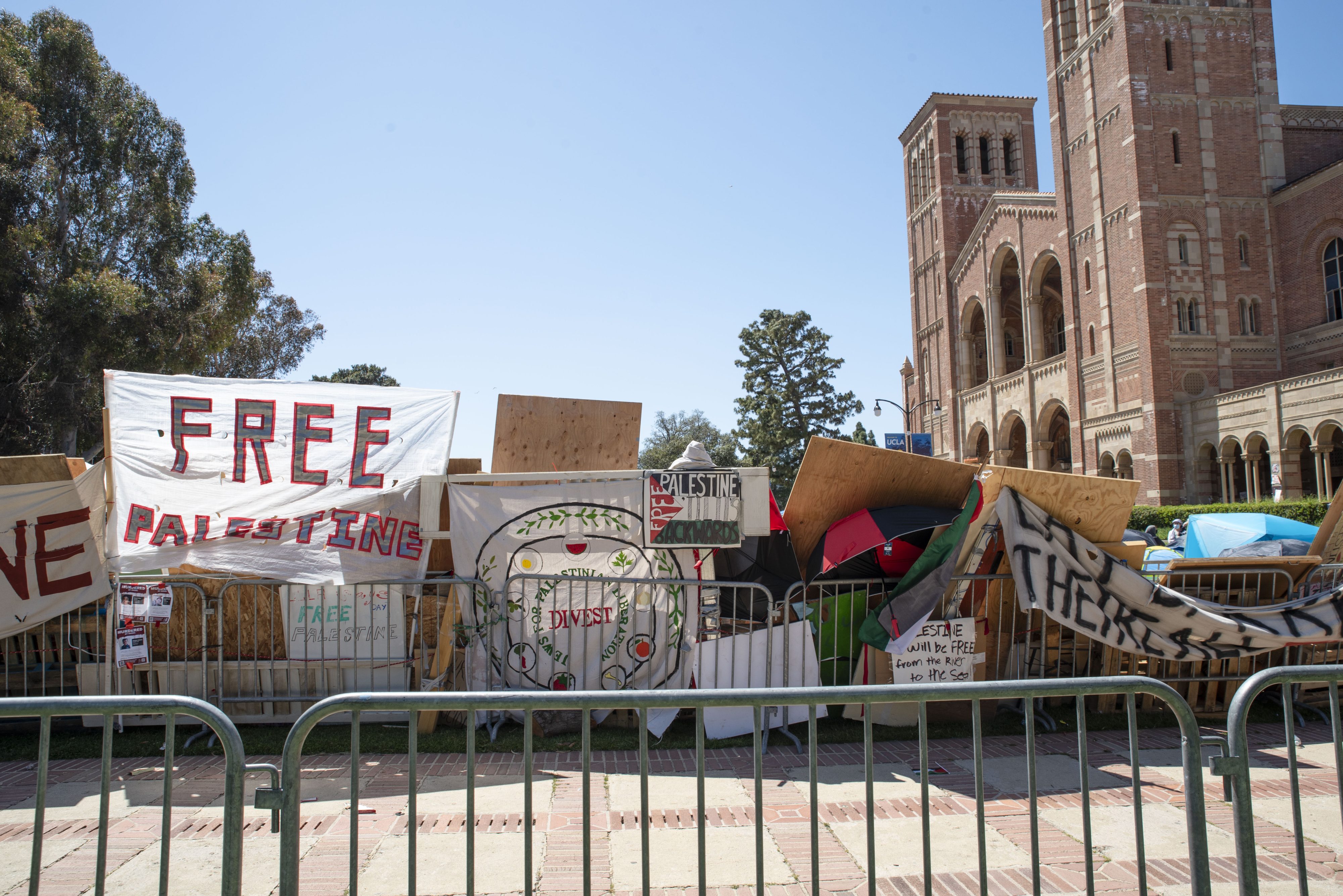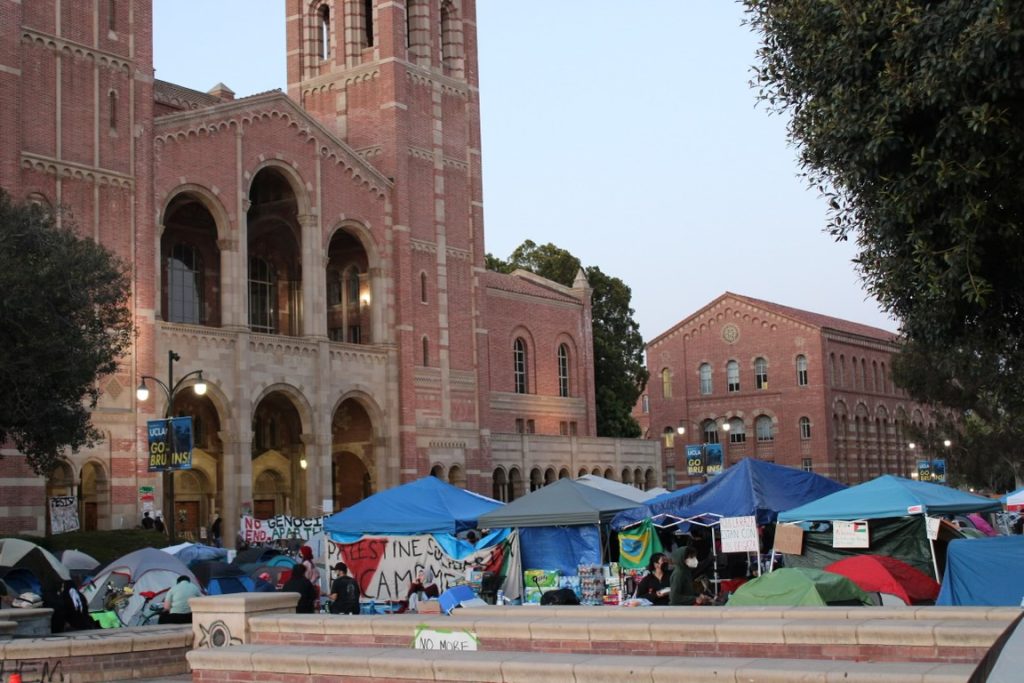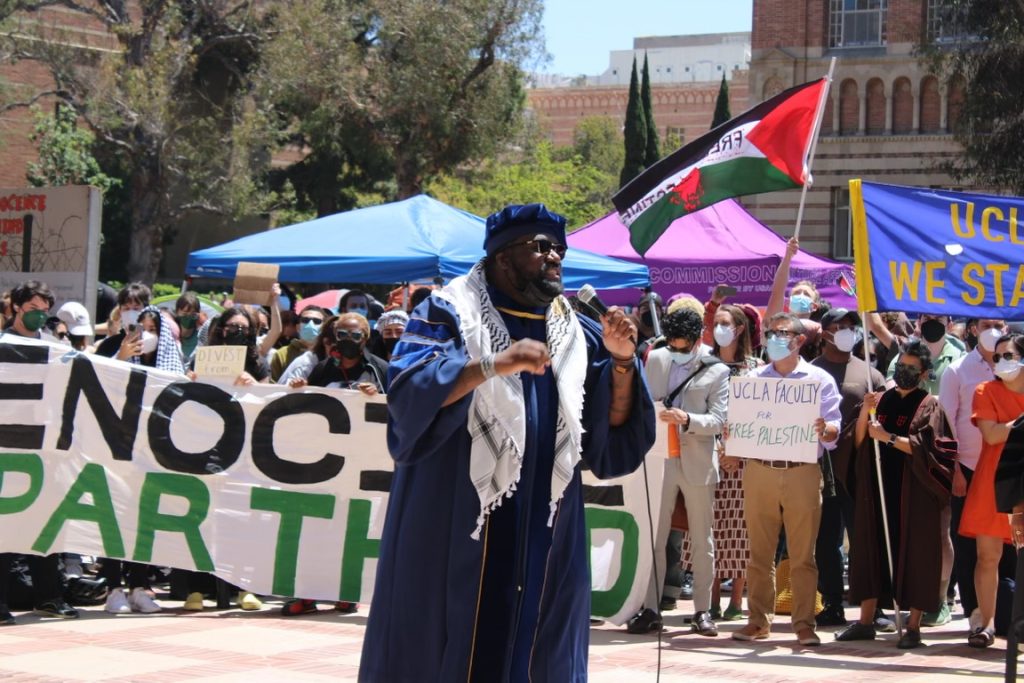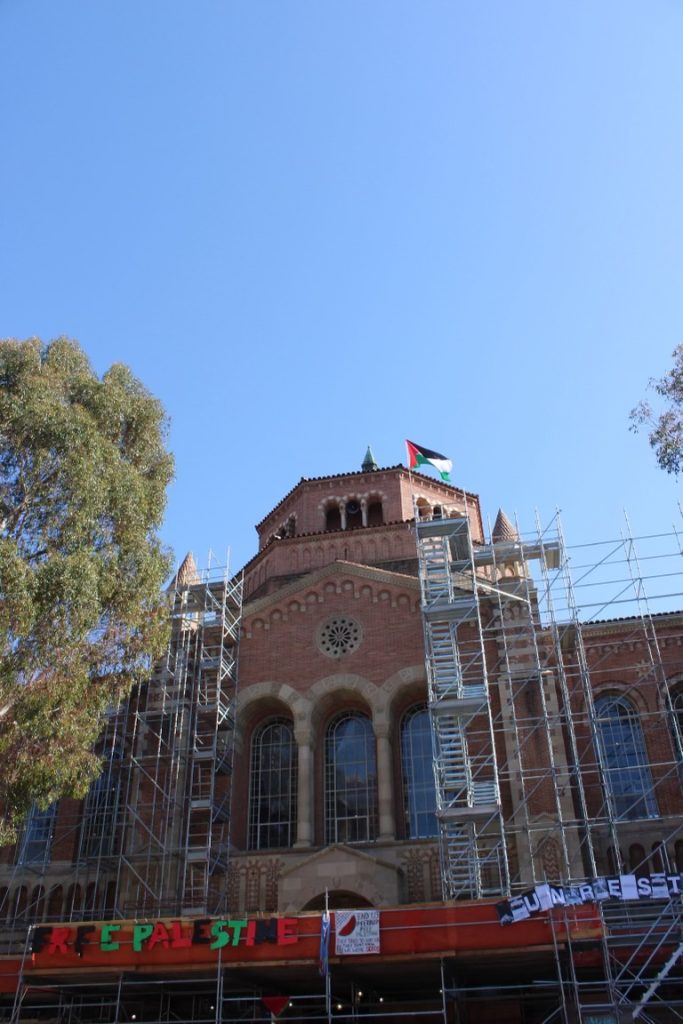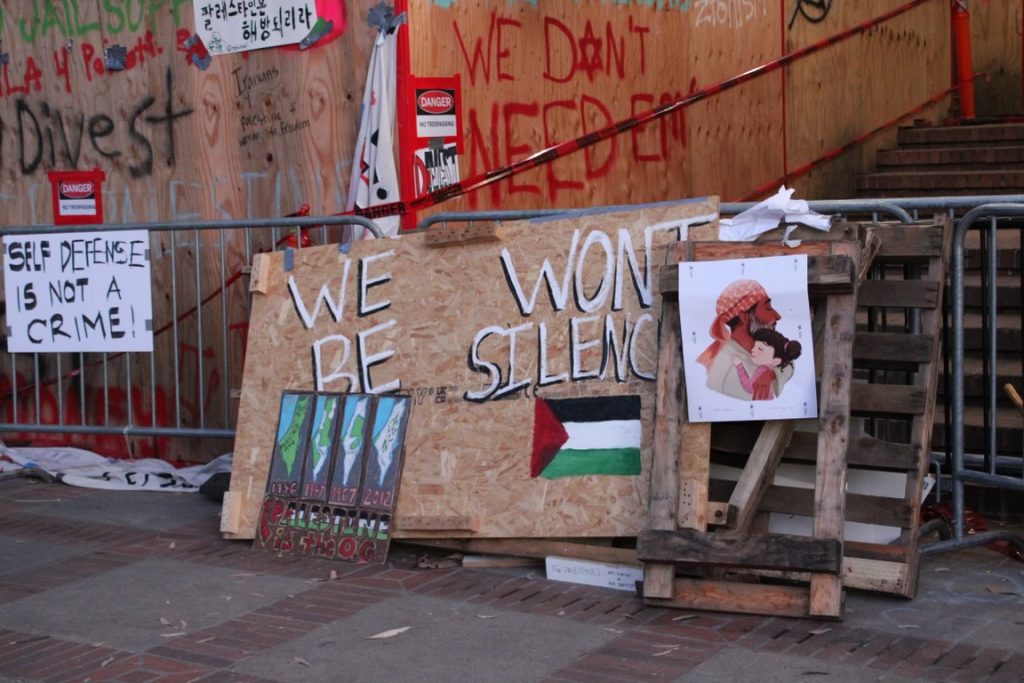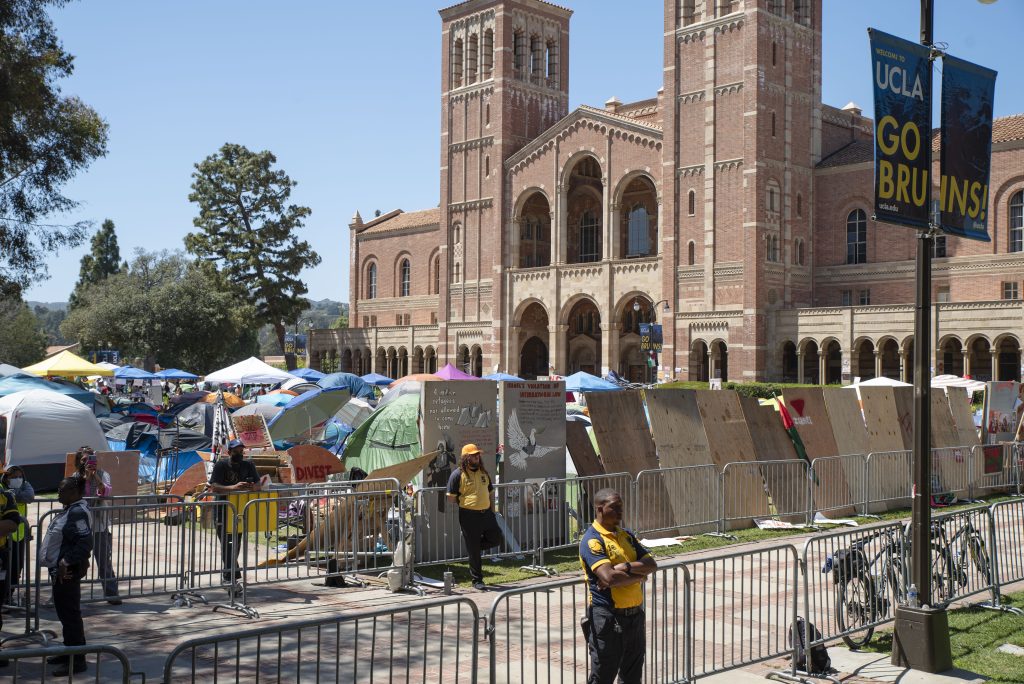
The pro-Palestine encampment envelops the grass in front of Royce Hall. Metal fences and wooden boards create a barrier denying access to the encampment. Photographed by Emily Chandler/BruinLife.
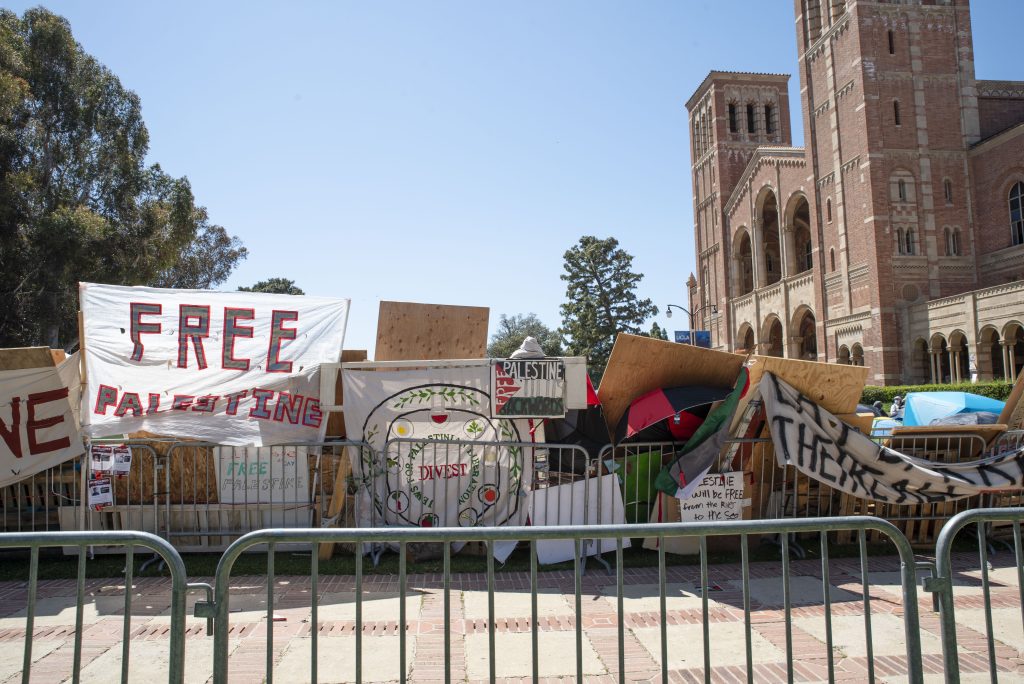
Signs and banners span the side of the makeshift barrier constructed by students within the encampment. Photographed by Emily Chandler/BruinLife.
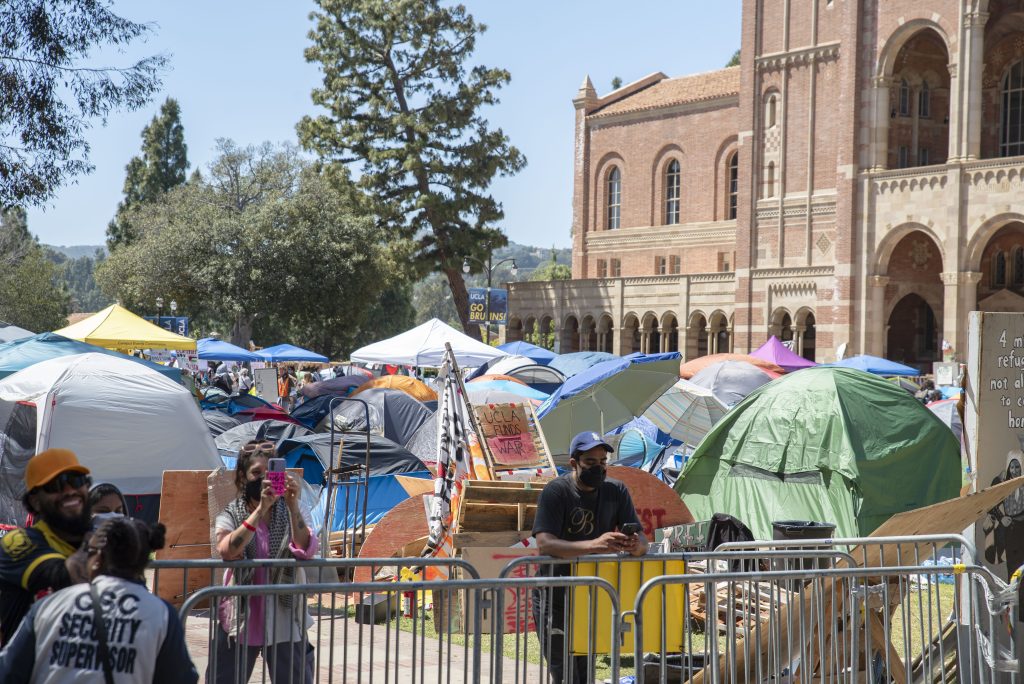
Around 50 tents are erected on the grass in Dickson Plaza. The encampment housed pro-Palestine protesters overnight for the past five days. Photographed by Emily Chandler/BruinLife.
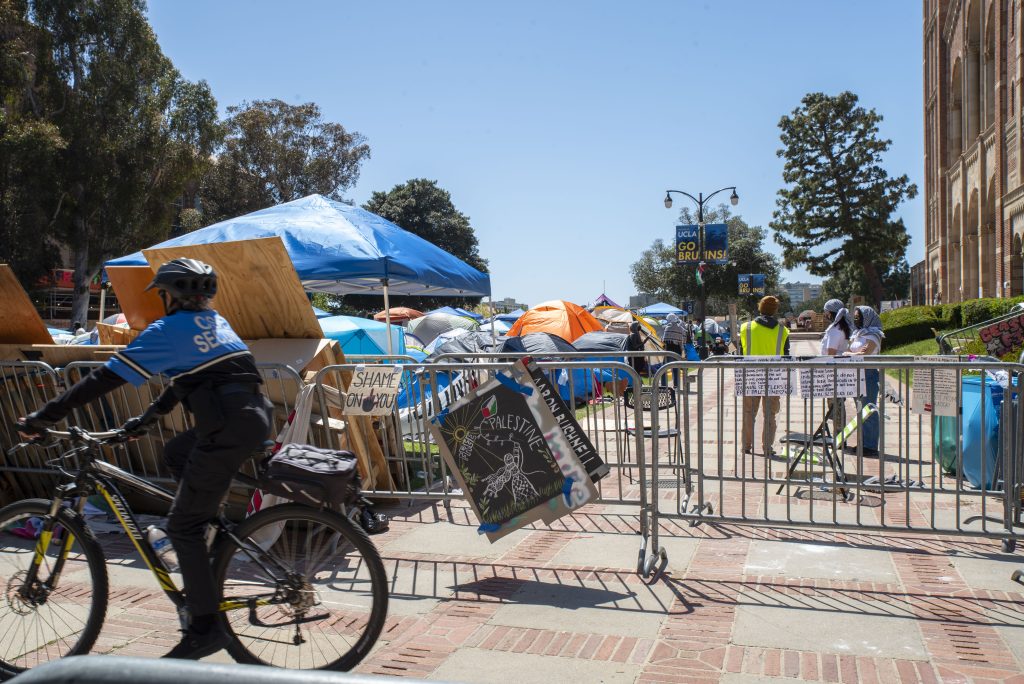
University security patrol the walkway between the encampment and the rest of Dickson Plaza. Students within the encampment can be seen monitoring the area. Photographed by Emily Chandler/BruinLife.
The encampment on Dickson Plaza has reached its fifth straight day of protest. After the events of Sunday’s counter-protest, campus security continues to regulate the flow of foot traffic across the lawn, denying almost all access to the immediate perimeter of the encampment. Standing in stark contrast to the ongoing pro-Israel protest, which enclosed and left behind its speaker and screen structure to broadcast looped videos taken of the missing hostages, the pro-Palestine encampment stays silent and has limited contact with media.
After persistent inquiry, BruinLife was granted permission to speak with Samuel Ahmed, a media liaison for UCLA’s chapter of the UC Divest Coalition, about the encampment’s ongoing protest. Read our interview below:
BruinLife: Seeing what’s happened at other universities, starting at Columbia, the USC campus — where police have been called in to clear protesters out — these protests are creating a scary situation and a lot of protesters here are putting themselves on the line. Safety is a factor, student status is a factor. How has this protest differed? What makes this protest peaceful? How do you hope to keep yourselves from clashing heads with UCPD, with the school — what is your strategy here?
Samuel Ahmed: All universities across the county are a part of the same movement, which is to resist. Our movement, in this UCLA Divest Coalition, we are for the school divesting from profiting off of genocide. Plenty of the UC schools, UCI starting today, are part of that resistance movement as well, and we don’t differ. We are the same. We are all seeking to bring attention to that genocide in Gaza and the way that UC invests in companies like BlackRock and Exxon Mobil to profit off of a genocide and to profit off of death, and we are here to end that culture of profiting off of the death of innocent civilians.
BL: Largely this has been a very peaceful protest in the face of many counter-protests. Yet, there have been small skirmishes, like just early a counter-protester ripped the sign from a pro-Palestine woman’s hands, provoking her to pull out a taser. Is there a clear chain of command for messages to spread? Is there a clear chain of command? How do you hope to avoid these clashes?
Ahmed: Our coalition is not hierarchical; there are community decisions, we are community-led, we seek to bring attention to this genocide in Palestine. As far as violence has occurred, that interaction you mentioned is a microcosm (of) how things have worked in general. We have seen escalation and aggression from pro-Israel, pro-Zionist counter-protesters, and we just seek to keep our resistance and hold true to make sure that the UC does not profit off of this genocide.
BL: What makes this protest everybody’s issue, even, if possible, the Israeli side — what is at stake?
Ahmed: This is a very human cause. Loss of life. Genocide. Indiscriminate killing. Things that everyone should and can get behind. I think people that are not involved are those that might believe that resistance is futile, that breaking the status quo is futile, but doing good is good. I think that protesting, the fight, is worth it for the fight itself, for the goal of bringing light to humanity, of bringing light to Gaza, to Palestinians being killed indiscriminately by the Zionist state. We as UC students in specific are allowing our money to kill Palestinians, to further genocide, and everyone should know that they don’t want that because they are human, and they should empathize, and they should join our fight, and it’s not futile.
BL: While divesting is a strong case, some argue that firms like BlackRock that spread their money wide — that this is a small pool in their portfolio — are there alternatives to financial divestment?
Ahmed: While divestment is our primary goal, we have a list of demands, including disclosing how our money is spent, including boycotting and severing ties with all Israeli institutions and exchange programs, and making a statement on the genocide, as the school remains staying silent and complicit with this genocide. There’s plenty of ways to protest. I believe that BlackRock is a massive part of the UC Regents and the endowment fund and that we should be calling for divestment.
BL: There are those who argue that this protest is antisemitic. What differentiates anti-Zionism from antisemitism?
Ahmed: We’ve been very clear on our goals that we are an anti-Zionist movement — that Israel, as a state, is bombing and furthering this genocide. I think that divestment, that calling for boycott, that calling for ceasefire, that calling for action, that calling for disclosure, that none of these things are at all antisemitic and that they are to end this indiscriminate killing and against this genocide in Gaza.
BL: Has any progress been made with the university?
Ahmed: I believe we’re in contact… I actually don’t know if you can quote me on that. I don’t believe that the admin has reached out, I believe that they made a statement a couple days ago that their investments in Israel are a part of their commitment to academic freedom — you can read that, I’m pretty sure that’s almost a direct quote. I think that calling for genocide is absolutely not academic freedom and that it’s an incredibly weak statement from the institution, and to believe that in any way what we are calling for will inhibit academic freedom is unbelievable, truly, and phrasing it in that way — genocide, indiscriminate bombing and the loss of life of 34,000 Palestinians in the last 200 days is unbelievable to me and that’s why we continue to do this.
BL: If you don’t mind, I’d like to ask you some questions about life inside the encampment.
Ahmed: I don’t believe that we are doing any inside-the-encampment talks currently, I’m sorry. We’re trying to avoid the cultures in the camps because they’re not their purpose. We are just trying to bring attention to Gaza and to our demands. What you see is what you observe, you can make your reports on that. The protesters are mostly students. We are a student-led coalition. This is our money. You could see that in our walkout today with our students, our faculty and our staff all want the same thing, that is, the divestment from the ongoing genocide in Gaza by the Israeli state.
The following photos have been provided to BruinLife by the UC Divest Coalition to give an exclusive glimpse from inside the encampment.
A memorial to members of the press murdered by the Israel Defense Forces is erected near the spiral staircase from Fowler Museum to Royce Hall. As of today, 97 members of the press have been confirmed to be killed while reporting the Israel-Palestine war, 92 of whom were Palestinian. Photograph provided by the Encampment Document Team.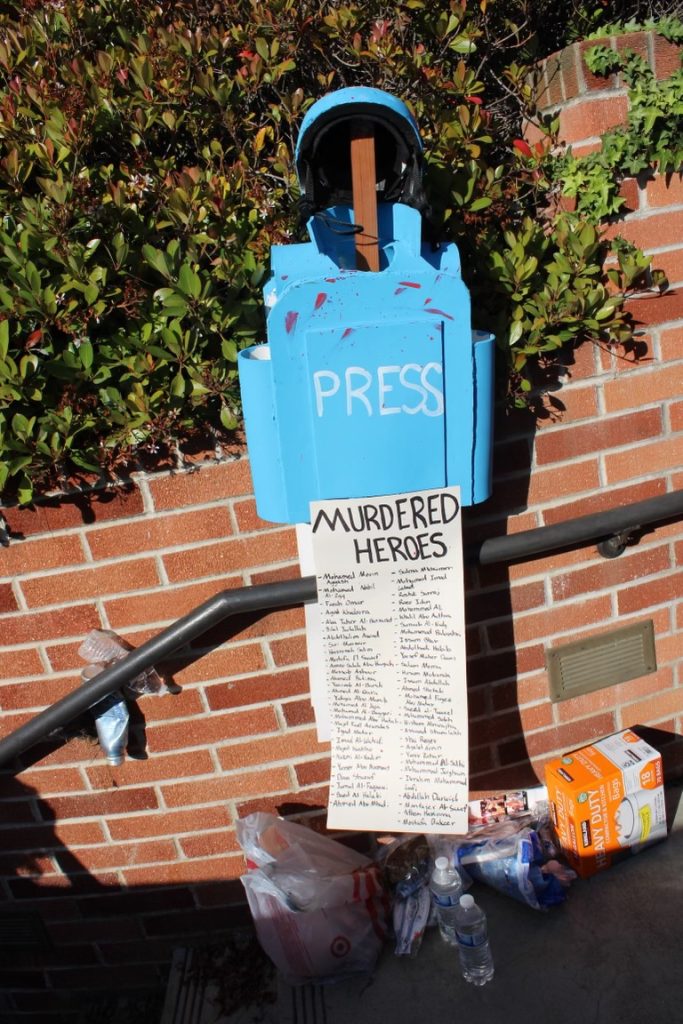
As pro-Palestine encampments on other U.S. university campuses have been resisted by the universities themselves or state police forces, the pro-Palestine encampment at UCLA has been resisted by the strongly organized counter-protest, pro-Israel force. The Daily Bruin reported in the early hours of today that around 60 pro-Israel counter-protesters forcibly tried to enter the encampment after a fight outside the barriers, requiring the presence of UCPD police in riot gear.
UC Regents released a statement in response to the encampments on Friday, April 26, stating that “The University of California has consistently opposed calls for boycott against and divestment from Israel.” Responding further, the same statement writes that “UC Investments provides a stable and growing revenue stream that benefits current and retired employees and supports the University’s education, research, and public service mission.”

